- Home
- V. E. Schwab
A Darker Shade of Magic Page 17
A Darker Shade of Magic Read online
Page 17
She’d done it.
Delilah Bard had finally escaped, sailed away. Not with a ship, but with a stone.
As for where she was exactly, she hadn’t the faintest idea. She got to her feet and realized that the red tint wasn’t coming from the sky, but from the ground. The world to her right was considerably redder than the world to her left. And, she realized, senses tuning, considerably louder. Not just the usual noise of peddlers and carts, for the Londons seemed to have that in common, but the din of a growing crowd, all cheers and shouts and celebration. Part of her knew she should stay still and wait for Kell to find her, but the other part was already moving toward the swell of light and color and sound.
Kell had found her once, she reasoned. He could do it again.
She tucked the black stone into the hidden pocket of her worn cloak (the dizziness upon letting go was brief and shallow) then scooped up Kell’s coat, dusted it off, and pulled it on over the top. She expected it to be bulky, if not outright unruly, but to her surprise, the coat fit perfectly, its silver buttons lying smooth and even on the rich black fabric.
Strange, thought Lila, shoving her hands into its pockets. Not the strangest thing by far, but still strange.
She wove through the streets, which were like her London in their narrow, twisting fashion and yet so different. Instead of rough stone and soot-stained glass, the shops were built of dark wood and smooth rock, colored glass, and shining metal. They looked strong and strangely delicate at once, and running through them all, through everything, was an energy (she could think of no other word). She walked in the direction of the crowd, marveling at the change wrought in the world, a world whose bones were shared with hers, but whose body was a new, glorious thing.
And then she turned a corner and saw the source of the commotion. Scores of people had gathered along a major road, bustling in anticipation. They had the air of commoners, and yet their dress was so much finer than Lila had ever seen on the commoners at home. Their style itself was not so foreign—the men wore elegant coats with high collars, the woman waist-cinched dresses under capes—but the materials flowed on them like melted metal, and threads of gold ran through hair and hat and cuff.
Lila pulled Kell’s silver-buttoned coat close around her, thankful she could hide the threadbare cloak beneath. In the cracks between the jostling crowd, she could make out the red river beyond, right where the Thames should have been, its strange light washing over the banks.
The Thames? A source of magic?
Perhaps the greatest source in the world. Not that you’d know it here, but if you could see it as it is in my London …
It was indeed magnificent. And yet, Lila was drawn less to the water and more to the ships blanketing it. Vessels of all shapes and sizes, from brigs and galleys to schooners and frigates, bobbed on the red waves, their sails billowing. Dozens of emblems marked the fabric on their masts and flanks, but over them all, red and gold banners had been hung. They glittered, taunting her. Come aboard, they seemed to say. I can be yours. Had Lila been a man, and the ships fair maidens guiding up their skirts, she could not have wanted them more. Hang the fine dresses, she thought. I’ll take a ship.
But though the mismatched fleet was enough to draw a gasp of approval from Lila’s lips, it was neither the gorgeous ships nor the impossible red river that held the crowd’s attention.
A procession was marching down the avenue.
Lila reached the edge of the crowd as a row of men paraded past clothed in swaths of dark fabric that wound around their bodies as if their limbs were spools. The men held fire in their palms, and when they danced and spun, the fire arced around them, tracing their paths and lingering in the air behind them. Their lips moved as they did, the words buried under the sounds of the parade, and Lila found herself pressing forward into the crush to get a better view. Too soon the men were gone, but in their wake a line of women came into view. Dressed in flowing gowns, they executed a more fluid version of the same dance, but with water. Lila watched, wide-eyed; it behaved like ribbon in their hands, twisting and curling through the air, as if by magic.
Of course, thought Lila, it is by magic.
The water dancers gave way to earth, and then metal and finally, wind, the last made visible by colored dust blown from palms into the air.
Every dancer was dressed in their own way, but all had ribbons of red and gold tied off along their arms and legs, trailing behind them like comet tails as they moved through the city.
Music rose in the dancers’ wake, strong as drums but sweet as strings, drawing notes Lila had never heard from instruments she had never seen. The musicians continued on, but the music lingered in the air, hanging over the crowd like a tent ceiling, as if sound itself could be made physical. It was hypnotic.
And then came the knights atop their mounts, armor shining in the sun and red cloaks billowing behind them. The horses themselves were glorious beasts, not speckled but solid whites and greys and glossy blacks almost as beautiful, thought Lila, as the ships. Their eyes were like polished stones, some brown, others blue, or green. Their glistening manes ran black or silver or gold, and they moved with a grace that didn’t match their size or pace.
The knights all held banners like jousting poles, a golden sun rising against a red sky.
Just then a huddle of young boys cut in front of Lila on their way past, trailing ribbons from their arms and legs, and she hooked one around the collar.
“What’s all this about?” she asked the squirming child.
The child’s eyes went wide, and he spit out a string of words in a tongue she did not recognize. It certainly wasn’t English.
“Can you understand me?” she asked, drawing out the words, but the boy only shook his head, wriggled in her grip, and spat out foreign words until she let him go.
Another, louder cheer rippled through the gathered crowd, and she looked up to see an open carriage approaching. It was pulled by a set of white horses and flanked by an armored guard. The carriage ran banners that were more ornate and more elaborate: here the sun she’d seen on so many flags rose over a chalice, as if the contents of the cup were morning light. The cup itself was marked by an ornate M, all of it woven in shades of gold thread against red silk.
In the carriage stood a man and a woman, holding hands, crimson cloaks pouring from their shoulders and pooling on the polished carriage floor. They were tan, both of them, with sun-kissed skin and black hair that showed off the gleaming gold crowns nested there. (Royalty, thought Lila. Of course. It was a different world. A different king and queen. But there was always royalty.)
And there between the king and queen, one boot up on the seat like a conqueror, stood a young man, a thin crown glinting in his dark, tousled locks, a cloak of pure gold spilling over his broad shoulders. A prince. He raised his hand in a wave to the crowd, and they devoured the gesture.
“Vares Rhy!” A shout went up from the other side of the parade, quickly taken up and carried on by a dozen other voices. “Vares Rhy! Vares Rhy!”
The prince flashed a dazzling smile and, several feet to Lila’s left, a young woman actually swooned. Lila scoffed at the girl’s silliness, but when she turned back to the parade, she caught the prince looking at her. Intensely. Lila felt her face go hot. He didn’t smile, didn’t wink, only held her gaze for a long, long moment, brow crinkling faintly as if he knew she didn’t belong, as if he looked at her and saw something else. Lila knew she should probably bow, or at least avert her eyes, but she stared stubbornly back. And then the moment passed. The prince broke into a fresh smile and turned back toward his subjects, and the carriage continued on, leaving ribbons and dancers and excited citizens in its wake.
Lila dragged herself back to her senses. She didn’t realize how far she’d pressed forward with the rest of the crowd until she heard the cluster of girls chattering at her elbow.
“Where was he?” murmured one of them. Lila started, relieved to hear someone speaking her language.
<
br /> “Ser asina gose,” said another, then, in heavily accented English, “You sound good.”
“Rensa tav,” said the first. “I’m practicing for tonight. You should as well, if you want a dance.” She rose up onto her toes to wave at the disappearing prince.
“Your partner in dance,” said a third in broken English, “is appears to be missing.”
The first girl frowned. “He is always in the procession. I do hope he is well.”
“Mas aven,” said the second, rolling her eyes. “Elissa is in love with the black-eyed prince.”
Lila frowned. Black-eyed prince?
“You cannot deny he is dashing. In a haunted kind of way.”
“Anesh. In a frightening kind of way.”
“Tac. He is nothing compared to Rhy.”
“Excuse me,” cut in Lila. The trio of girls twisted toward her. “What is all this?” she asked, waving her hand at the parade. “What’s it for?”
The one who spoke in broken English let out an amazed laugh, as though Lila must be joking.
“Mas aven,” said the second. “Where are you from that you do not know? It is Prince Rhy’s birthday, of course.”
“Of course,” echoed Lila.
“Your accent is remarkable,” said the one who’d been searching for her black-eyed prince. Elissa. “Who is your tutor?”
Now it was Lila’s turn to laugh. The girls only stared at her. But then trumpets—at least they sounded roughly like trumpets—began to sound from the direction the royals and the rest of the festival had come, and the crowd, now in the procession’s wake, moved toward the music, taking the cluster of girls with it. Lila stepped out of the throng and brought her hand to her pocket, checking to make sure the black rock was still there. It was. It hummed, wanting to be held, but she resisted the urge. It may be clever, but so was she.
Without the procession blocking her view, Lila could fully see the glittering river on the other side of the road. It shone with an impossible red light, as if lit from beneath. A source, Kell had called the river, and Lila could see why. It vibrated with power, and the royal procession must have crossed a bridge, for now it trailed down the opposite bank to far-off chants and cheers. Lila’s eyes trailed along the water until they reached a massive, vaulting structure that could only be the palace. It sat not on the banks of the river, like parliament, but over the river itself, spanning the water like a bridge. It seemed carved out of glass, or crystal, its joints fused with copper and stone. Lila took in the structure with hungry eyes. The palace looked like a jewel. No, a crown of jewels, better sized to a mountain than a head.
The trumpets were issuing from the steps, where servants in red and gold half-cloaks were pouring out, carrying trays of food and drink for the masses.
The scent on the air—of strange food and drink and magic—was utterly intoxicating. Lila felt her head swimming with it as she stepped into the street.
The crowds were thinning, and between the emptying road and the red river, a market had blossomed like a hedge of roses. A portion of the masses had gone with the royal parade, but the rest had taken to the market, and Lila followed.
“Crysac!” called a woman, holding up fiery red gems. “Nissa lin.”
“Tessane!” urged another, with what looked like a steaming metal teapot. “Cas tessane.” He waved two fingers in the air. “Sessa lin.”
Everywhere merchants announced their wares in their strange tongue. Lila tried to pick up terms here and there, to pair the shouted words with the items held aloft—cas seemed to mean hot, and lin, she guessed, was a kind of coin—but everything was bright and colorful and humming with power, and she could hardly focus long enough to keep track of anything.
She pulled Kell’s coat tighter about her shoulders and wandered the booths and stalls with hungry eyes. She had no money, but she had quick fingers. She passed a stall marked ESSENIR, and saw within a table piled high with polished stones of every color—not simple reds or blues, but perfect imitations of nature: fire yellow, summer grass green, night blue. The merchant’s back was to her, and she couldn’t help herself.
Lila reached for the nearest charm, a lovely blue-green stone the color of the open sea—at least, the color she imagined it must be, the color she’d seen it painted—with small white marks, like breaking waves. But when her fingers curled around it, a hot pain seared across her skin.
She gasped, more from the shock of being burned than the heat itself, and pulled back sharply, hand singing. Before she could retreat, the merchant caught her by the wrist.
“Kers la?” he demanded. When she didn’t answer—couldn’t answer—he started shouting faster and louder, the words blurring together in her ears.
“Unhand me,” she demanded.
The merchant’s brow furrowed at the sound of her voice. “What you think?” he said, in guttural English. “You get free by speaking fancy?”
“I haven’t the faintest idea what you’re talking about,” snapped Lila. “Now let go.”
“Speak Arnesian. Speak English. Doesn’t matter. Still gast. Still thief.”
“I am not a gast,” growled Lila.
“Viris gast. Fool thief. Tries to steal from enchanted tent.”
“I didn’t know it was enchanted,” countered Lila, reaching for the dagger at her waist.
“Pilse,” growled the merchant, and Lila had a feeling she’d just been insulted. And then the merchant raised his voice. “Strast!” he shouted, and Lila twisted in his grip to see armored guards at the edge of the market. “Strast!” he called again, and one of the men cocked his head and turned toward them.
Shit, thought Lila, wrenching free of the merchant’s grip, only to stumble back into another set of hands. They tightened on her shoulders and she was about to draw her knife when the merchant went pale.
“Mas aven,” he said, hunching forward into a bow.
The hands holding Lila vanished, and she spun to find Kell standing there, frowning his usual frown and staring past her at the merchant.
“What is the meaning of this?” he asked, and Lila didn’t know which surprised her more: his sudden appearance, the way he spoke to the merchant—his voice cool, dismissive—or the way the merchant looked at him, with a mixture of awe and fear.
Kell’s auburn hair was pushed back, his black eye on display in the red morning light.
“Aven vares. If I knew she was with y-you…” stammered the merchant before lapsing back into Arnesian, or whatever the language was called. Lila was surprised to hear the tongue pour out of Kell’s mouth in response as he tried to calm the merchant. And then she caught that word again, gast, on the merchant’s tongue and lunged for him. Kell hauled her back.
“Enough,” Kell snarled in her ear. “Solase,” he said to the merchant, apologetically. “She’s a foreigner. Uncivilized, but harmless.”
Lila shot him a dark look.
“Anesh, mas vares,” said the merchant, bowing even lower. “Harmful enough to steal…” With his head down, the merchant didn’t see Kell look back over his shoulder at the guard weaving through the market toward them. He didn’t see the way Kell stiffened. But Lila did.
“I will buy whatever she tried to take,” said Kell hastily, digging a hand in the pocket of his coat, unconcerned by the fact Lila was still wearing it.
The merchant straightened and started shaking his head. “An. An. I cannot be taking money from you.”
The guard was getting closer, and Kell clearly didn’t want to be there when he arrived, because he fetched a coin from the coat and set it on the table with a snap.
“For your trouble,” he said, turning Lila away. “Vas ir.”
He didn’t wait for the merchant’s answer, only shoved Lila through the crowd, away from the stall and the guard about to reach it.
“Uncivilized?” growled Lila as Kell clasped her shoulder and guided her out of the market.
“Five minutes!” said Kell, sliding his coat from her shoulders and back ont
o his own, flicking up the collar. “You can’t keep your hands to yourself for five minutes! Tell me you haven’t already gone and sold off the stone.”
Lila let out an exasperated noise. “Unbelievable,” she snapped as he led her out of the throngs and away from the river, toward one of the narrower streets. “I’m so glad you’re all right, Lila,” she parroted. “Thank God using the stone didn’t rip you into a thousand thieving pieces.”
Kell’s hand loosened on her shoulder. “I can’t believe it worked.”
“Don’t sound so excited,” shot Lila drily.
Kell came to a stop and turned her toward him. “I’m not,” he said. His blue eye looked troubled, his black unreadable. “I’m glad you’re unhurt, Lila, but the doors between worlds are meant to be locked to all but Antari, and the fact that the stone granted you passage only proves how dangerous it is. And every moment it’s here, in my world, I’m terrified.”
Lila found her eyes going to the ground. “Well, then,” she said. “Let’s get it out of here.”
A small grateful smile crossed Kell’s lips. And then Lila dug the stone out of her pocket and held it up, and Kell let out a dismayed sound and swallowed her hand with his, hiding the stone from sight. Something flickered through his eyes when he touched her, but she didn’t think it was her touch that moved him. The stone gave a strange little shudder in her hand, as if it felt Kell and wanted to be with him. Lila felt vaguely insulted.
“Sanct!” he swore at her. “Just hold it up for all to see, why don’t you.”
“I thought you wanted it back!” she shot back, exasperated. “There’s no winning with you.”
“Just keep it,” he hissed. “And for king’s sake, keep it out of sight.”
Lila shoved it back into her cloak and said a very many unkind things under her breath.
“And on the topic of language,” said Kell, “you cannot speak so freely here. English is not a common tongue.”
“I noticed that. Thanks for the warning.”
“I told you the worlds would be different. But you’re right, I should have warned you. Here English is a tongue used by the elite, and those who wish to mingle with them. Your very use of it will cause you to stand out.”

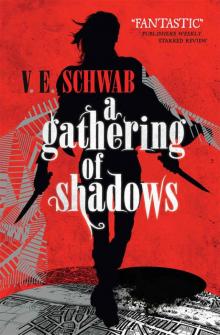 A Gathering of Shadows
A Gathering of Shadows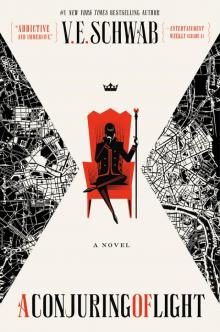 A Conjuring of Light
A Conjuring of Light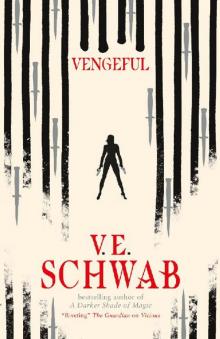 Vengeful
Vengeful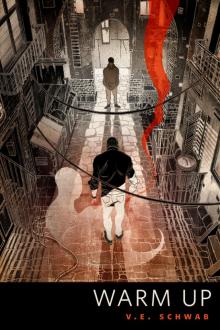 Warm Up
Warm Up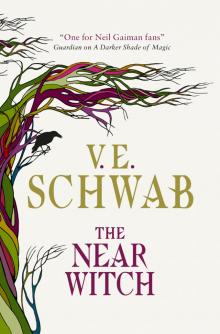 The Near Witch
The Near Witch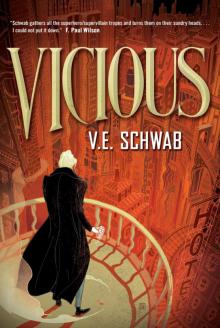 Vicious
Vicious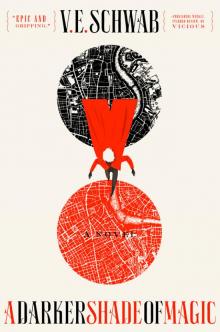 A Darker Shade of Magic
A Darker Shade of Magic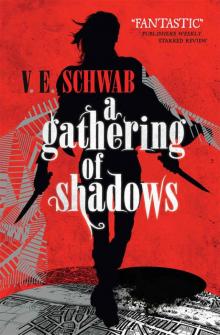 Gathering of Shadows (A Darker Shade of Magic)
Gathering of Shadows (A Darker Shade of Magic)